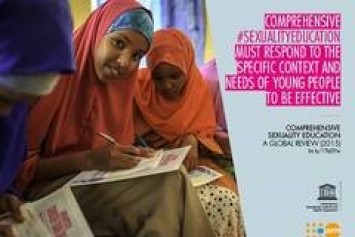Europa/Suecia y Noruega/Marzo 2016/Fuente y Autor:EducationInternational(EI)
Resumen: La UNESCO ha expresado en un reciente informe (Evidencia Emergente, Lecciones y Practicas en Educación Sexual Integral-Una revisión global de 2015) que la educación sexual es la clave para mejorar la igualdad de género y salud reproductiva. El informe menciona la reducción de infecciones de transmisión sexual, el VIH y los embarazos no deseados, a consecuencia de una buena salud sexual. Promover la igualdad de género, el aumento de autoestima, la construcción de la auto-eficacia, los derechos humanos y las normas sociales equitativas, también tiene un importante impactos sobre los comportamientos sexuales más seguros, tales como: el uso del condón y el retraso en el inicio sexual. Se hace reflexión a la potenciación de los niños y los jóvenes en relación ampliar su concepto de sexualidad como parte natural del desarrollo humano; con la formación de un profesorado que de forma eficaz construya en los niños y jóvenes conocimientos y habilidades que sean apropiados para cada etapa a través de un proceso a lo largo del tiempo, desde los planes de estudio y con la participación perenne de los padres y las comunidades. Por ello en el informe se refleja que la educación debe desempeñar un papel fundamental en la prevención y eliminación de todas las formas de discriminación que puedan hacer frente a las mujeres y niñas afectadas por el VIH/SIDA. Por último, el informe fue creado en consulta con el Fondo de Población de las Naciones Unidas, la Secretaria del ONUSIDA y los gobiernos de Suecia y Noruega.
The CSE leads to improved sexual and reproductive health, resulting in the reduction of sexually transmitted infections, HIV, and unintended pregnancy, according to the report. CSE not only promotes gender equality and equitable social norms, but has a positive impact on safer sexual behaviours, delaying sexual debut, and increasing condom use. The report was launched by the Health and Education section of UNESCO on 3 March.
Transition into adulthood
In addition, the global review revealed the impact of CSE on improved levels of knowledge and self-esteem, changing attitudes, gender and social norms, and building self-efficacy. These are particularly critical during adolescence, as young people make the transition into adulthood.
Core elements of CSE programmes share certain similarities: CSE’s firm grounding in human rights – including the rights of the child, and the empowerment of children and young people – and a reflection of the broad concept of sexuality as a natural part of human development.
Teacher training
Effective sexuality education starts early in childhood and progresses through adolescence and adulthood, building knowledge and skills that are appropriate for each stage through a carefully phased process over time, like any other subject in the curriculum.
The report further finds that teacher training was crucial to the effective delivery of CSE, as building teacher capacity to deliver age-appropriate, culturally relevant CSE is proven to support the development of students’ life skills. It also stressed that effective implementation and scale-up of CSE is reliant on engagement and support from parents and whole communities.
EI: Role of education vital
“This UNESCO report supports the idea, defended by Education International (EI) for a long time, that education must play a fundamental role in the prevention and elimination of all forms of discrimination that could face women and girls affected with HIV/AIDS,” explained EI General Secretary Fred van Leeuwen.
Several other studies conducted at national and international level have shown that the lack of education in general, and particularly on reproductive health and HIV prevention, increases the vulnerability of women and girls who then have little power to decide on fundamental aspects of their lives. Schools could play a “protective role,” he added.
Momentum
The report also acknowledges a global momentum, and that young people are increasingly demanding their right to sexuality education, as evidenced by the 2011 Mali Call to Action, declarations at the 2011 International Conference on AIDS and STIs in Africa, the 2012 Bali Global Youth Forum Declaration, the 2014 Colombo Declaration on Youth, youth delegates’ inputs to the post-2015 development agenda through the ‘Have you seen my Rights?’ coalition, and advocacy efforts of the PACT coalition of youth organisations.
Based on the examination of CSE status in 48 countries across the world, the report was created in consultation with the United Nations Population Fund and the UNAIDS Secretariat, and was made possible with support from the Governments of Sweden and Norway.
Fuente de la noticia:http://www.ei-ie.org/en/news/news_details/3891
Fuente de la imagen:http://www.ei-ie.org/kroppr/eikropped/UNESCO_SexualEducation_145711022014571102209108.jpg






 Users Today : 23
Users Today : 23 Total Users : 35459489
Total Users : 35459489 Views Today : 29
Views Today : 29 Total views : 3417787
Total views : 3417787